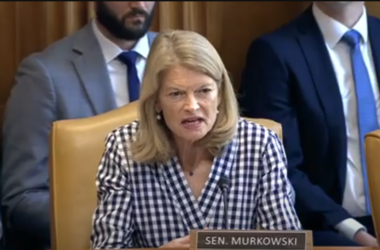The Savanna’s Act Guidelines for Alaska are complete following hundreds of hours of consultation with Alaska Tribes and tribal agencies, federal, state, local and tribal law enforcement, and victim service providers. The bill that became law in October 10, 2020 was named after Savanna LaFontaine-Greywind, a member of the Spirt Lake Nation of North Dakota, who was murdered while she was eight months pregnant in August 2017.
The legislation was co-sponsored by Alaska’s Senator Lisa Murkowski who spoke on Savanna’s Act several years ago:
“One of the frustrations that we have come to realize when it comes to so many of our native peoples is that we simply don’t have a grasp of the extent of the problem that we’re dealing with and when we’re talking about missing and murdered Indigenous women, part of the problem is just knowing how big it is.”
Sen. Murkowski added:
“So many of our indigenous women and children are becoming these statistics, are not necessarily on the reservations or out in the most remote of Alaska villages, but in our urban areas. So, making sure that we do not have these gaps in reporting is going to be a critical and important first step.”
Savanna’s Act aims to improve the government’s response to the crisis of missing and murdered Indigenous persons through increased coordination and the development of best practices. It directs the U.S. Department of Justice to develop guidelines to continually improve communication and coordination among tribal, federal, state, and local law enforcement agencies in response to such cases.
The legislation also provides guidance on the collection, reporting and analysis of missing and murdered Indigenous persons; offers resource information for Tribal governments; and provides practices for culturally appropriate victim services and for returning a loved one home. The office of Sen. Murkowski says that these guidelines are evergreen with ongoing opportunities for input and recommendations.
Rob Heun, U.S. Marshal for the District of Alaska:
“The U.S. Marshals will continue to partner with our federal, state, local and tribal partners to strengthen our response to missing and murdered Indigenous people. The shared commitment of each agency’s resources and expertise will increase our ability to make our communities safer.”
President Biden signed the Violence Against Women Act Reauthorization Act of 2022 into law in March as part of a $1.5 trillion omnibus spending package. The Office of Violence Against Women Act will continue to work with Tribes to address challenges in protecting survivors and responding to offenders in their communities and encourage Tribal leaders and designees to attend the 17th Annual Government-to-Government Violence Against Women Tribal Consultation in Anchorage in September.
Links below:
- Department of Justice Savanna’s Act page: https://www.justice.gov/tribal/mmip/SavannasAct
- Link to Savanna’s Act law: https://www.congress.gov/bill/116th-congress/senate-bill/227/text
- Department of Justice MMIP page: https://www.justice.gov/tribal/mmip
- Not Invisible Act page and Commission members: https://www.doi.gov/priorities/strengthening-indian-country/not-invisible-act-commission






